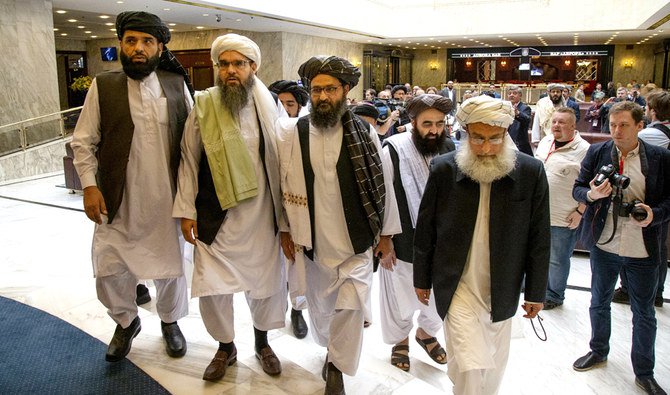Taliban talks with Indonesian Muslim leaders focus on furthering Afghan peace process

Taliban chiefs have held a series of talks with Indonesian Muslim leaders over the future peace process for Afghanistan, it was revealed on Wednesday.
A high-level delegation of Taliban officials met with government representatives and Islamic scholars during an under-the-radar visit to the Indonesian capital Jakarta, which began at the weekend.
On Tuesday, delegates led by the Taliban’s political deputy, Mullah Baradar Akhund, held discussions with leaders of Indonesia’s largest Muslim organization Nahdlatul Ulama (NU), and the country’s highest authority on Islamic affairs, the Indonesian Ulema Council (MUI), at their headquarters in central Jakarta.
NU chairman, Abdul Manan Ghani, told Arab News on Wednesday that the main topic of the meeting was how the warring factions in Afghanistan could make peace with each other in order to build a stable community based on the spirit of Islamic brotherhood.
“We extended our views that they should place priority on having dialogue among the factions in Afghanistan and should not let other countries meddle in with their own vested interests, which could compromise an already fragile situation there,” Ghani said.
He added that the Taliban could also take an example from Indonesia, a country that remained peaceful, largely tolerant and democratic despite its very diverse society and geography made up of 17,000 islands.
“Afghanistan can be a peaceful society, too, especially since it is much less diverse than Indonesia and society is contained in a much smaller location,” Ghani said.
Earlier in the day, the Taliban delegation also met with scholars from the MUI. During talks the council agreed to assist with peace-making efforts between the Afghan government and the Taliban and help advise on ways to address various problems in Islamic society.
Muhyiddin Junaidi, head of the MUI’s international relations department, told Arab News: “We would help to make peace in Afghanistan in accordance with our capacity as an organization and to complement the government’s diplomatic efforts.”
He said the MUI had also offered its assistance in providing scholarships for Afghan students to study in Indonesia’s Islamic boarding schools and universities. “We also extended our assistance on how to issue fatwas in response to the various social, economic and cultural problems that Muslims face,” Junaidi added.
Taliban spokesman, Zabihullah Mujahid, said in a press statement that during the meeting, Baradar and his colleagues had “highlighted the current situation of Afghanistan, policy and achievements” made by the Taliban.
Pictures circulating on social media showed the Taliban delegation visiting the Istiqlal Mosque, the largest mosque in southeast Asia.
Abu Hurairah Abdul Salam, a spokesman for the mosque, confirmed to Arab News that a delegation from Afghanistan, which he described as “guests of the vice president,” took part in maghrib prayers on Monday afternoon but did not meet any mosque officials.
Despite its positive role in trying to help broker peace in Afghanistan, the Indonesian government has kept mostly quiet about the Taliban trip, which began on Saturday afternoon with a visit to Vice President Jusuf Kalla’s official residence in central Jakarta, maghrib prayer at a nearby mosque and then dinner at his house which ended at 9 p.m.
Kalla’s office issued a brief statement on Sunday about the dinner, saying that Indonesia always maintained communication with all parties involved in brokering peace in Afghanistan in order to maintain trust and make progress in the process. The vice president also said that his country continued to communicate with the US over the issue.
However, the release was removed from the VP’s website on Monday morning and some national news publications were asked to retract stories based on the statement. A spokesman for the Indonesian foreign ministry acknowledged that the meeting had taken place in an “informal” manner but declined to issue any further information.
